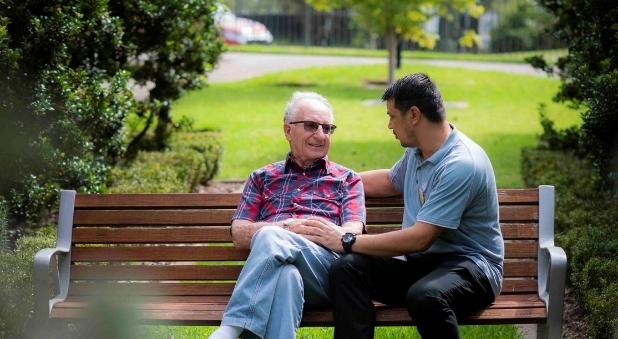There’s a worrying statistic that many people aren’t aware of, affecting the lives of Australian senior citizens.
Ann Gaffney knows this all too well. An elderly gentleman she visited one day seemed unusually distressed. His ears had a buzzing that doctors had diagnosed as tinnitus. However, the sounds were constant and rather frightening, and he felt as though he was under attack.
During her visit, the gentleman confessed that his distress was making him consider harming himself. “He was having suicidal thoughts,” says Ms Gaffney, a senior mental health clinician and program manager at Anglicare. “He’s so distressed, and he thinks these sounds are real, and he’s thinking of harming himself.”
According to the Australian Bureau of Statistics, men over 85 have the highest suicide rate in the country. In 2020, the suicide rate among men over 85 was 36.2 deaths per 100,000 people – significantly higher than the next highest figure, also for men, of 27.1 deaths per 100,000 for those aged 40-44 and 50-54 (by contrast, women aged over 85 had a suicide rate of 6.2 deaths per 100,000 people).
To respond to these heartbreaking statistics, Anglicare has rolled out the Suicide Prevention for Seniors Program. It’s designed to equip those working closely with senior citizens so they can recognise the risk signs and step in to offer hope, as well as connect people to services and resources that can help.
You can make a difference
“You don’t need to be an expert,” says Mike Sheedy, the head of mental health at Anglicare. “Our program will give people the skills and confidence [to assist]. Just like if someone falls over, you can give them CPR and help keep them alive until a medical professional comes along, so, too, it is with people in psychological distress.”
Supported by the NSW Government’s Suicide Prevention Fund 2020-2024, the program will use an online course, webinars and resources to educate key supporters of older people, including aged care workers, pastoral carers, doctors and pharmacists. Yet the program is not limited to these groups and the training would benefit anyone who regularly interacts with the elderly.
Mr Sheedy says while younger people are generally more open to having conversations about mental wellbeing, older people may be less likely to seek out support. “At Anglicare, we want to recognise that and build the capacity of those who already have the trust of older people,” he says. “We want to build their capacity to see risks of suicide, and be able to have meaningful and helpful conversations to give people hope.
“If you can give people hope, and if people feel heard and safe to open up, you can usually avert suicide and save lives.”
Suicide risks for seniors can include such things as functional impairment, retirement, perceiving themselves to be a burden, the grief of losing a life partner and chronic pain. “It’s not so much that their bodies are deteriorating, it’s how they feel about it,” Mr Sheedy says. “If they’ve got a positive attitude, they’re often fine, but others might look at [their circumstances] in a really unhopeful way.”
It’s okay to ask the “S” question
He adds that it is not harmful to ask someone if they’ve been feeling suicidal. “Some people might back off from that conversation because they worry about putting that idea in [someone’s] head. If people feel like that, you won’t be putting that idea in their head. Quite the opposite. Often the very act of asking someone frankly – saying, ‘I’m noticing that you’re not your old self, are you feeling like you might want to harm yourself?’ – that could be the first time someone has asked.
When the elderly man confessed his suicidal thoughts to Ms Gaffney she remained calm, validated the man’s feelings and showed empathy. “They [the elderly clients] want us to be calm, to accept, to encourage directness, and by being direct, [the gentleman] can voice his innermost thoughts,” she says.
There was relief on the gentleman’s face as Ms Gaffney finished her visit. He was relieved of the emotional tension he was feeling by airing his suicidal thoughts, and she was able to connect him with services that could help him. After a few months, the gentleman reflected that he was feeling more relaxed, and now has more hope for the future.
Says Mr Sheedy: “The general experience is that, for most people who are asked, it comes as a blessing and a relief. Often asking the question can reduce psychological distress.”
If you are interested in participating in the new program (or are making inquiries for someone else) please email suicideprevention@anglicare.org.au. Those who are at immediate risk or know someone who is can contact Lifeline on 13 11 14, Beyond Blue on 1300 22 4636 or the Suicide Call Back Service on 1300 659 467.






















